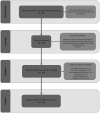The impact of Exergames on emotional experience: a systematic review
- PMID: 37744509
- PMCID: PMC10512833
- DOI: 10.3389/fpubh.2023.1209520
The impact of Exergames on emotional experience: a systematic review
Abstract
Background: Gamification has proven to be a significant tool for health promotion, with a particular focus on physical activities such as Exergames, which improve not only physical, but also cognitive health. However, it is still not clear what effect the practice of Exergames has on changing the emotional experience.
Purpose: The objective of this systematic review is to evaluate the impact of Exergames training on emotional experience.
Methods: A systematic search was conducted in the PUBMED and SCOPUS databases. The relevant articles were screened independently by three researchers. Data concerning emotional measures and Exergame practice were extracted for analysis.
Results: The search yielded 38 articles, of which 16 were included. Exergames were found to significantly impact happiness, anxiety, depressive symptoms, mental health-related quality of life, self-worth, self-esteem, self-efficacy, perceived behavioral control, vigor, vitality, intrinsic motivation, perceived energy, and relaxation.
Conclusion: Our review supports the evidence that the practice of physical activity through Exergames, on the emotional experience generally generates an increase in positive emotions. In this sense, the results found support both the use of Exergames as a leisure activity that promotes wellbeing and emotional regulation, as well as for health promotion, public health, and clinical practice purposes. Our review strongly supports the notion that engaging in physical activity through Exergames generally leads to an increase in positive emotions. As a result, these findings endorse the utilization of Exergames as a leisure activity to promote well-being and emotional regulation. Moreover, Exergames hold potential for health promotion, public health, and clinical practice purposes.
Keywords: Exergame; emotion; emotion regulation; gamification; health promotion; public health.
Copyright © 2023 Marques, Uchida and Barbosa.
Conflict of interest statement
The authors declare that they have no known competing financial interests or personal relationships that could have appeared to influence the work reported in this paper. The handling editor VO declared a part collaboration with the author PU.
Figures
References
-
- Deterding S., Khaled R., Nacke L., Dixon D. (2011). “Gamification: toward a definition.” in Proceedings of the 2011 Annual Conference Extended Abstracts on Human Factors in Computing Systems.
-
- Ning Y, Jia Z, Zhu R, Ding Y, Wang Q, Han S. Effect and feasibility of gamification interventions for improving physical activity and health-related outcomes in cancer survivors: an early systematic review and meta-analysis. Support Care Cancer. (2023) 31:92. doi: 10.1007/s00520-022-07550-0 - DOI - PubMed
Publication types
MeSH terms
LinkOut - more resources
Full Text Sources
Research Materials




